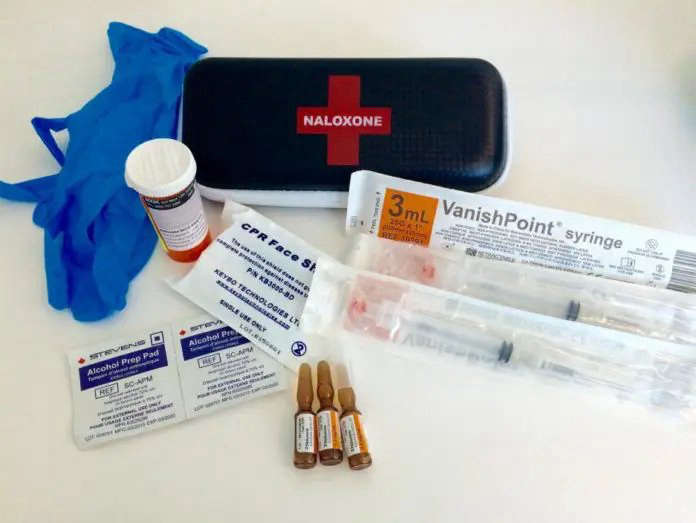
The province has released its latest report on the drug toxicity and overdose crisis with 37 recommendations aimed at saving lives and moving BC out of the current public health emergency.
The all-party committee report makes recommendations to further scale-up the government's response to ensure that all British Columbians can access high-quality substance-use support and care when they need it.
The recommendations were made by the Select Standing Committee (SSC) on Health.
The report recommends a substantial funding increase for recovery and detox programs, as well as redirecting overdose and mental health from police to more specialized responders when possible.
It also suggests expanding a take-home naloxone program and engaging with health-care providers to reduce barriers in prescribing a safe supply of drugs.
In April, the BC Legislative Assembly declared that it would be up to the SSC to make recommendations on how to deal with the illicit, toxic drug supply and overdoses.
“The poisoned drug supply is taking the lives of our loved ones, with a disproportionate impact on Indigenous people,” said Minister of Mental Health and Addictions, Sheila Malcolmson.
“This is unacceptable. We must end this tragic loss of life.”
“The committee’s report and recommendations reinforce our government’s continued action to expand and build new supports and services throughout the province.”
“As the illicit drug supply gets increasingly more toxic, we face a rising tide of need in British Columbia. There is more to do to tackle this public-health emergency.”
“We will not stop working until we turn this crisis around and people in our province can get the help they need.”
In total the SSC made 37 recommendations. In short, the areas of which they see needs work are:
- Overarching government response
- Rapidly scale up supports and comprehensive care
- Health authorities expanding harm reduction, treatment and recovery
- Integrate people who use or have used drugs in the creation and implementation of any new legislation surrounding drug use
- Prevention and education
- Increase funding for awareness and anti-stigma initiatives
- Increase funding for affordable and accessible housing for individuals at all stages of substance abuse
- Fund supportive housing initiatives and community supports
- Create evidence-based guidelines on prescribing opioids
- Treatment and recovery
- Fund more public outpatient recovery programs
- Create legislation that will give framework to the province in regard to all-encompassing treatment
- Create a provincial system to analyze and publish data based on recovery strategy and effectiveness
- Make methadone and other opioid agonist treatment more readily available province-wide
- Review and update policy regarding opioid agonist treatment
- Include public input in comprehensive reviews of the Mental Health Act within six months of this report’s release
- Work with all levels of government to ensure recovery will not affect an individual’s immigration status
- Harm reduction
- Implement province-wide standardization of harm reduction services
- Make naloxone kits readily accessible, focusing distribution on high-risk populations
- Safer supply
- Fund measures to make sure a prescribed safe supply is available in all areas of the province
- Review and update policies surrounding prescribed safer supply
- Enforcement and decriminalization
- Prioritize modernization of policing in BC, especially surrounding mental health and social matters
- Work will all levels of government to stop the supply of illicit, toxic drugs being imported to the country
- Support and implement decriminalization
- Indigenous people
- Create Indigenous-led, culturally appropriate services surrounding substance use
- Prioritize work with BC First Nations Justice Council to reduce the number of Indigenous people in the criminal justice system
- Use recommendations from previous reports for government action on reducing stigma and racism towards Indigenous people, especially Indigenous women
- Youth
- Expand in-school prevention and education programs
- Fund access to mental health and substance abuse supports for youths
- Fund and provide timely evaluations of children with attention deficit hyperactivity disorder (ADHD) and other neurodiverse conditions
- Additional measures
- Provide sustainable multi-year funding to groups in the mental health and substance abuse fields
- Improve deployment of first responders to mental health and substance abuse crises
- Fund positions for new health care and social services workers
- Fund personnel for emergency rooms to provide referrals for harm reduction supplies
- Expand supports for families grieving the loss of a family member who dies of a drug poisoning
- Expand access to harm reduction for those coming out of the provincial correctional system
For the full report, click here.


 Park-And-Fly Options Urged As Holiday Travel Picks Up
Park-And-Fly Options Urged As Holiday Travel Picks Up
 19 Wing Comox To Attain New Apartment Building For CAF Housing
19 Wing Comox To Attain New Apartment Building For CAF Housing
 New Modular Units Expand Homewood Supportive Housing In Campbell River
New Modular Units Expand Homewood Supportive Housing In Campbell River
 Speculation And Vacancy Tax Bringing More Homes To Market
Speculation And Vacancy Tax Bringing More Homes To Market
 Campbell River Shoebox Project Wraps Up Holiday Campaign
Campbell River Shoebox Project Wraps Up Holiday Campaign
